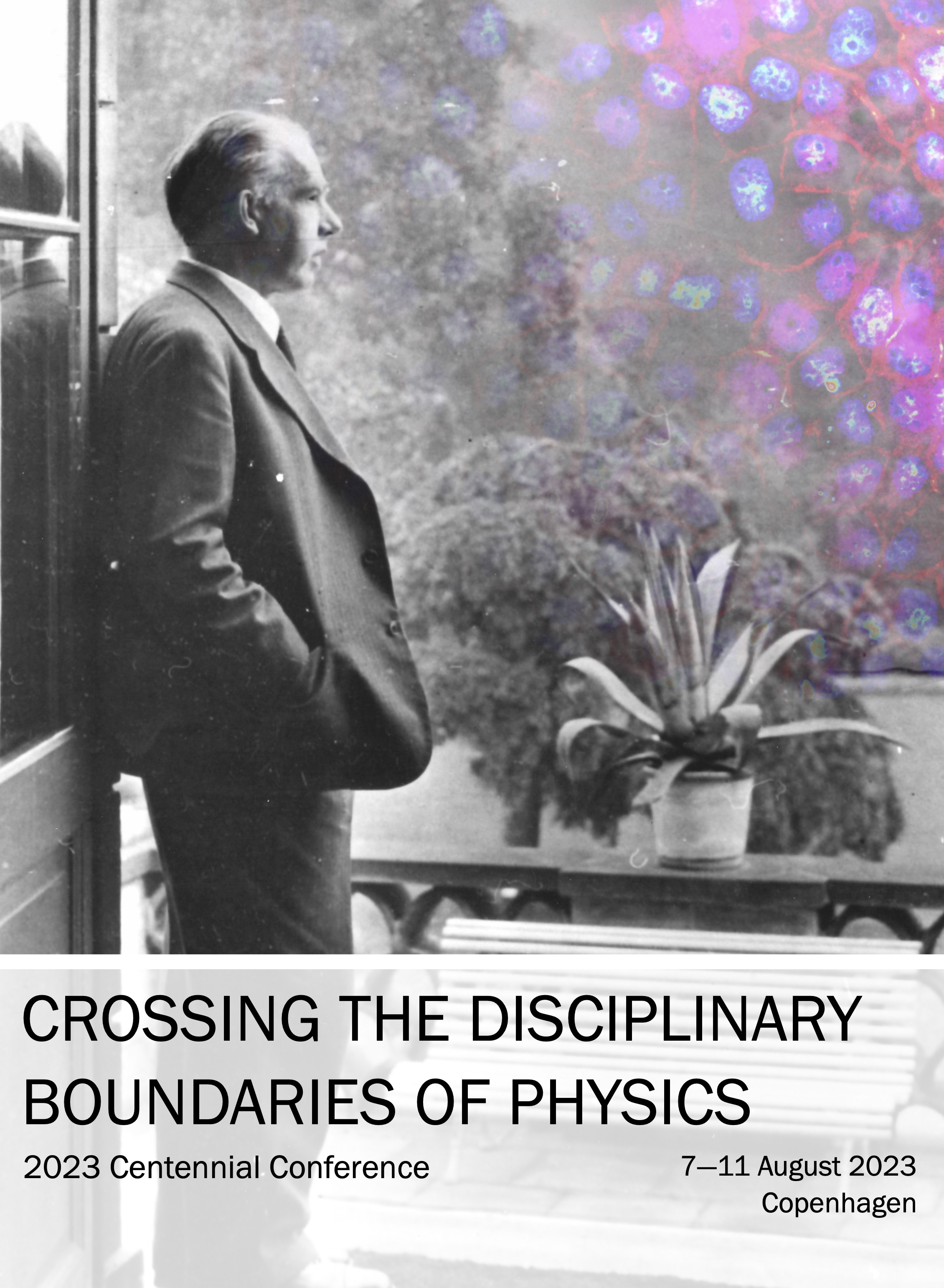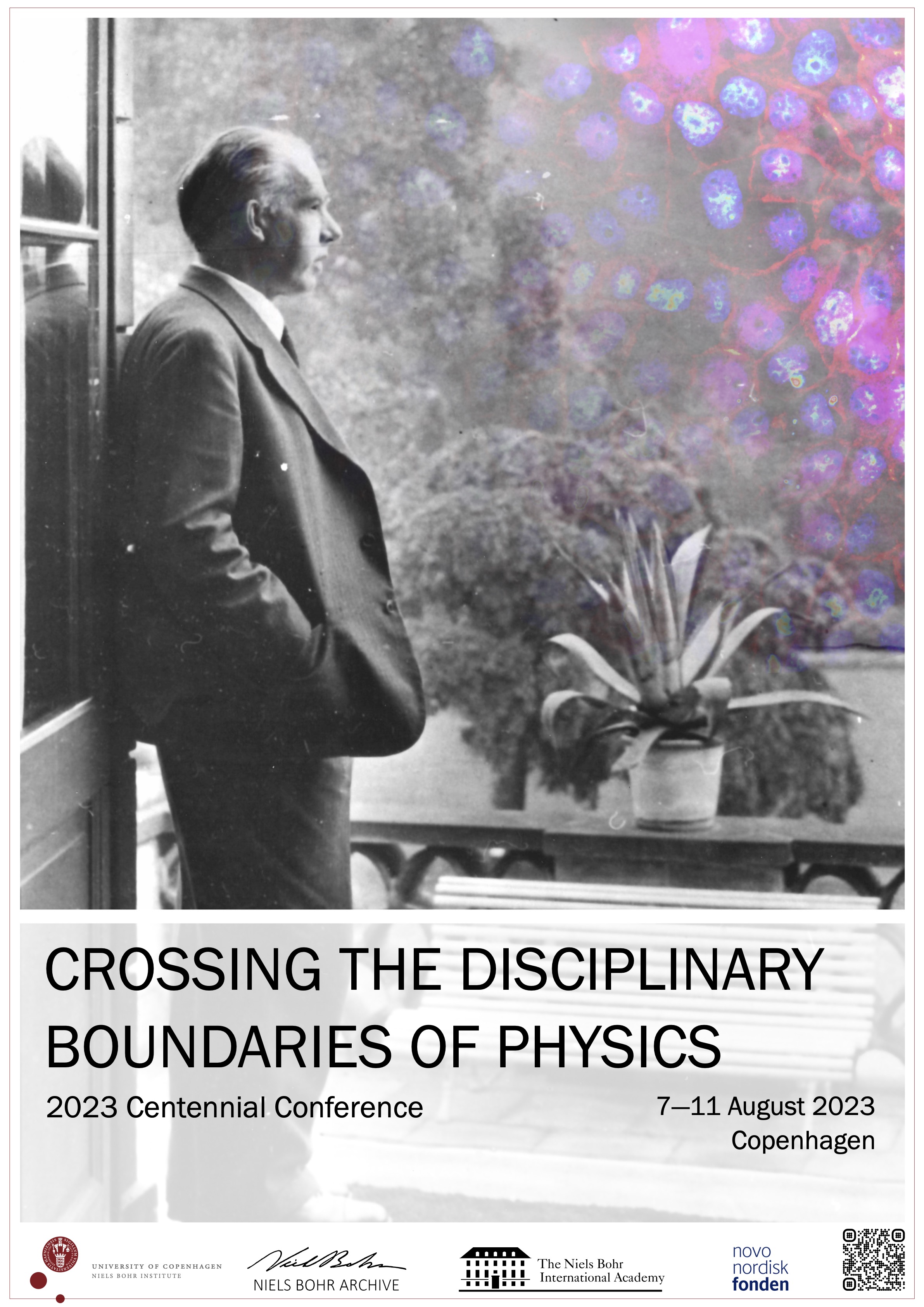The conference
 From 7–11 August 2023, the Niels Bohr Archive, the Niels Bohr International Academy, and the Niels Bohr Institute will host the Centennial Conference “Crossing the Disciplinary Boundaries of Physics.” It is part of a series of events dedicated to celebrating the centenaries of the Niels Bohr Institute (founded in 1921) and Niels Bohr’s Nobel Prize in Physics (awarded to him in 1922).
From 7–11 August 2023, the Niels Bohr Archive, the Niels Bohr International Academy, and the Niels Bohr Institute will host the Centennial Conference “Crossing the Disciplinary Boundaries of Physics.” It is part of a series of events dedicated to celebrating the centenaries of the Niels Bohr Institute (founded in 1921) and Niels Bohr’s Nobel Prize in Physics (awarded to him in 1922).
The conference focuses on the borderlines between physics and other disciplines. It will be held in an innovative three-part format consisting of the following:
- A three-day history-of-science meeting addressing the history and philosophy of cross-disciplinarity between physics and other fields, broadly construed (7–9 August);
- A three-day scientific meeting zoning in on the borderlines between physics and biology and addressing cross-disciplinarity in physics from the perspective of current as well as future cutting-edge research (9–11 August);
- A public celebration in the afternoon of Wednesday, 9 August, opened by HRH The Crown Prince and with a lecture by 2022 Nobel Laureate Morten Meldal. The public celebration will be followed by a festive reception.
The organizers gratefully acknowledge generous funding from a conference grant by the Novo Nordisk Foundation.
The vision behind the conference
Both the 1921 founding of Niels Bohr's Institute for Theoretical Physics (NBI) and the 1922 awarding of the Nobel Prize in Physics to Niels Bohr stand as significant dates in the history of science. Not only because NBI played a vital role in the genesis of quantum mechanics during the 1920s and in nuclear and biological physics during the 1930s. But even more so because the Copenhagen Institute epitomizes the coming-about of new approaches to close scientific collaboration in a novel type of creative environment, which helped foster closer cooperation between all groups of actors involved in science and across geopolitical and disciplinary boundaries. Over the twentieth century, the unique ways of doing science at NBI have influenced the creation of some of the most innovative scientific institutions in the world.
Over the past decades, physics's disciplinary structure and physicists' roles and practices have changed considerably. We see it as fitting that the institutions jointly organizing this conference—as heirs of Niels Bohr's legacy—spearhead a debate about the cross-disciplinary past and future of physics by organizing an international conference whose format and outlook goes well beyond that of most meetings in any of the individual fields involved.
While the historical meeting will address cross-disciplinarity in physics in general, the scientific meeting will focus on the borderlines between physics and the life sciences in current and future cutting-edge research.
The organizers
The core organizing committee consists of Vilhelm A. Bohr, Christian Joas, Amin Doostmohammadi, and Niels Emil J. Bjerrum-Bohr and is assisted by administrative officer Signe Strecker.
The conference committee consists of Vilhelm A. Bohr, Karin Tybjerg, Richard Staley, Christian Joas, Amin Doostmohammadi, Niels Emil J. Bjerrum-Bohr, Anja Cetti Andersen, Mogens Høgh Jensen, Kim Sneppen, Poul Damgaard, and Jan Westenkær Thomsen.
The host institutions
The Niels Bohr Archive (NBA) is an independent institution overseen by the University of Copenhagen with its own Board of Directors. It holds extensive archival material documenting the life and work of Niels Bohr and the history of physics in the twentieth century. It has established itself as one of the central institutions worldwide for documenting and researching the history of modern physics and its social and philosophical implications.
The Niels Bohr International Academy (NBIA) is an independent center of excellence hosted by the Niels Bohr Institute, whose mission is to attract the best and the brightest to Denmark and to provide the environment to enable breakthrough research in the physical sciences and mathematics in areas such as astroparticle physics, biophysics, condensed matter, quantum devices, particle physics, cosmology, and theoretical astrophysics. It is a central institution in Denmark for enabling knowledge transfer within physics and between physics and other disciplines.
The Niels Bohr Institute (NBI) is the world-renowned physics institute of the University of Copenhagen, which since 1965, on the occasion of Niels Bohr‘s 80th birthday, bears the name of its founder. Today, it is the home of ca. 230 researchers, ca. 85 administrative and technical staff, ca. 150 PhD students, and ca. 800 students. In 2013, the European Physical Society declared NBI a “Historic Site” with great international importance for developments in physics and research. NBI’s research spans many different areas, such as astronomy, geophysics, nanophysics, particle physics, quantum physics, and biophysics, and many of its activities have vital interdisciplinary components that include collaborations with scientists and engineers from many different fields, prominently in areas relevant for this proposal, such as molecular biology, biochemistry, and medicine.
The history-of-science meeting (7–9 August 2023)
We choose a focus that goes beyond the borderline between physics and the life sciences because the historical study of cross-disciplinary interactions between physics and other disciplines is still in its infancy—which is something that we hope to help change through this meeting.
Examples of interactions between physics and the life sciences from NBI’s history are, for instance, Niels Bohr’s and George de Hevesy’s pioneering forays into biology and radio medicine in the 1920s and 1930s, James Franck’s and Hilde Levi’s contributions to photosynthesis research during the 1930s, the close relationship between Bohr’s assistant Fritz Kalckar and his brother, the biochemist Herman Kalckar, and its influence on biochemistry and bioenergetics in the 1930s and beyond, Max Delbrück’s life between physics and genetics, or George Gamow’s contributions to genetics during the 1950s.
More recent examples, examples from fields other than the life sciences, and examples not connected to the history of NBI will be topics of the meeting as well.
Click here for the detailed program for Monday and here for the detailed program for Tuesday.
Confirmed Speakers
Dania Achermann, Wuppertal and Bern
Hanne Andersen, Copenhagen
Soraya de Chadarevian, UCLA
Olival Freire Jr., Salvador da Bahia
Karl Grandin, Stockholm
Gregory A. Good, West Virginia University
Kristine C. Harper, Copenhagen
John L. Heilbron, UC Berkeley
Matthias Heymann, Aarhus
Liselotte Højgaard, Copenhagen
Anja Skaar Jacobsen, Copenhagen
Christian Joas, Copenhagen
David I. Kaiser, MIT
Shaul Katzir, Tel Aviv
Helge Kragh, Copenhagen
Kärin Nickelsen, Munich
Caterina Schürch, Berlin
Phillip R. Sloan, University of Notre Dame
Richard Staley, Copenhagen and Cambridge
The science meeting (9–11 August 2023)
The three-day science meeting, titled “Crossing the Disciplinary Boundaries of Physics: Current and Future Perspectives,” will focus on interactions between physics and the life sciences and aims at presenting an encompassing perspective on the manifold interactions between these disciplines now and in the future.
Specific topics include (a) quantitative biology, (b) structural biology, (c) biological physics, (d) soft condensed matter physics, (e) active matter, (f) systems biology, and (g) AI and machine learning. These hot topics thrive in the interplay between life sciences, physics, mathematics, and computer science. Physicists have often been instrumental in making the needed interconnections and are expected to become even more relevant for such topics in the coming years.
This meeting aims to bring to Copenhagen top players worldwide who are working at the interface between physics and the life sciences, with the ambitious goal of setting a course for future directions. Using the weight and appeal of NBI’s centenary celebration, we invite the speakers to “think big” and lay out those new and exciting research directions in the life sciences where physics is expected to play a pivotal role.
Click here for the detailed program for Thursday and here for the detailed program for Friday.
Confirmed Speakers
Andreas Bausch, TU Munich
Ewine van Dishoeck, Leiden
Nikta Fakhri, MIT
Morten Meldal, U. Copenhagen
David Nelson, Harvard
Rob Phillips, Caltech
Manu Prakash, Stanford
Leonie Ringrose, Humboldt University Berlin
David Weitz, Harvard
Julia Yeomans, Oxford
The public celebration (9 August 2023)
A public celebration on Wednesday, 9 August, from 14:00–16:20 will be opened by HRH The Crown Prince. Other speakers include Mads Krogsgaard Thomsen (CEO Novo Nordisk Foundation), Stinus Lindgreen (Member of the Danish Parliament), and Henrik C. Wegener (Rector, University of Copenhagen). The main lecture will be given by 2022 Nobel Laureate Morten Meldal. The public celebration will be followed by a festive reception for all participants at the conference venue from 16:20–17:50. See the detailed program here.
Important: Please note that due to the presence of HRH The Crown Prince, everyone needs to be seated latest at 13:45 for the public event. Nobody will be admitted after this time.

